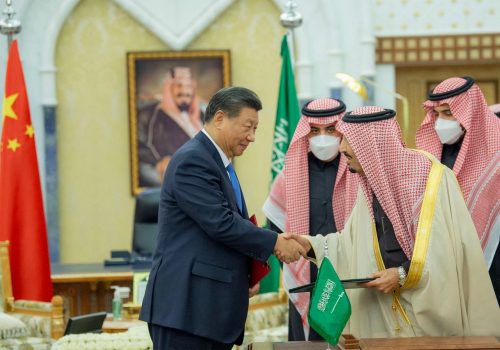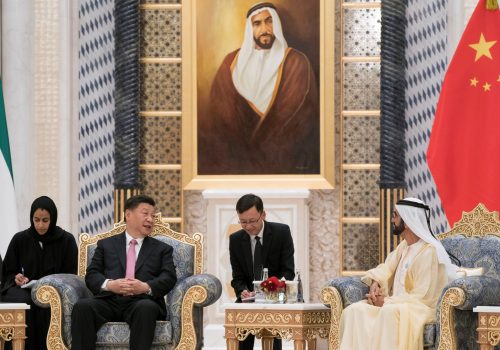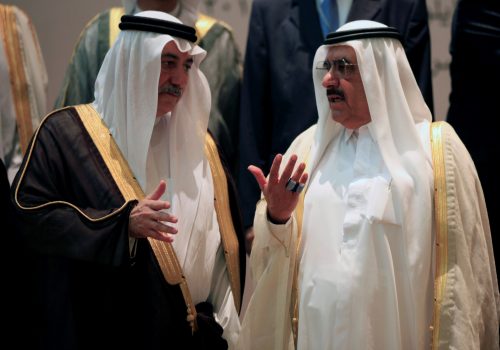The US has learned to work with governments that the president isn’t close to. Saudi Arabia is no different.
In late 1993, the US State Department sent me to Riyadh for a temporary assignment as US charge d’affaires to the Kingdom of Saudi Arabia. This followed three years as Deputy Assistant Secretary for Near East Affairs (1990-1993), during which our relations with Saudi Arabia were one of my major preoccupations.
While my time in Riyadh was brief, it coincided with a Gulf Cooperation Council summit in the Saudi capital and the inaugural meeting of the Shura Council, a high-level advisory body of distinguished Saudi citizens. At other times, I had the honor of being present at meetings with several Saudi monarchs and senior princes, including Salman bin Abdulaziz Al Saud, now King Salman, when he was the Governor of Riyadh. Those experiences impressed upon me the importance of Saudi Arabia’s regional leadership and the potential for its domestic political evolution.
Beginning in the closing years of World War II, the United States government became more actively involved in the Middle East. In February 1945, President Franklin D. Roosevelt met with Saudi King Abdul Aziz Ibn Saud aboard a US naval vessel, symbolizing the US strategic interest and high-level personal touch that Saudi leaders have come to expect. Ever since, the United States has found it necessary to conduct extensive relations with Saudi Arabia.
For US leaders, however, this does not mean that a close personal relationship between the US president and the king of Saudi Arabia is essential. As with other countries important to US interests in the Middle East and North Africa—Israel, Egypt, and Turkey come to mind—the US has learned how to work with governments during periods when they have leaders to whom our president is not close to.
The important thing is that the two peoples share mechanisms through which all their varied interests—security, economic, cultural, and educational—can be addressed. In my experience, ninety-nine percent or more of the official relations between Saudi Arabia and the United States occurred below the summit level. The two allies have very complex relationships with very substantial embassies in both capitals. Saudi Arabia has long had a very active and well-staffed embassy in Washington, often with a ruling family member as ambassador.
Currently, the ambassador is Princess Reema bint Bandar bin Sultan bin Abdulaziz Al Saud. This is an excellent appointment that reflects the rapidly improving status of women in Saudi society within the past decade.
On the US’s side, there is a large diplomatic mission in Riyadh, with career diplomat Michael Ratney becoming ambassador in March after a delay that risked hurting the health of the relationship. Both governments maintain constituent posts in other cities to help conduct complex business and consular relations between Saudis and Americans.
The US and Saudi Arabia also have a wide range of active relationships between senior military officers and senior military personnel. In addition, various very important commercial and economic relations occur in diverse venues within the frameworks of relevant legal systems. Complexity and mutual respect are hallmarks of ties that have grown in importance for nearly a century. Established institutions, such as the liaison channels between US Central Command and Saudi counterparts, have outlasted personalities.
With that in mind, the United States must acknowledge that Crown Prince Mohammed bin Salman’s (MBS) role is inescapable given the realities of Saudi domestic politics. The meeting that took place when President Joseph Biden traveled to Saudi Arabia on July 15, 2022, was very controversial in the United States.
Some US media coverage was dominated by much ado about a fist bump. The reality, however, is that it enabled Biden to have meetings with several key Arab leaders and to advance US relations with Saudi Arabia in a businesslike manner. Yes, President Biden and MBS met face-to-face but did not meet in a private, tête-à-tête format. The US president showed his respect for royal protocol by meeting with King Salman and not making a fuss about the presence of the crown prince. In the much longer, substantive meeting, top advisors flanked both leaders. In the case of Biden, there were nearly a dozen on his side of the big table, led by Secretary of State Antony Blinken. This was nothing like the contacts that took place between former President Donald Trump and Russian President Vladimir Putin in Helsinki in 2018, in which there was a cordial public meeting.
Like most US presidents, Biden usually conducts relations with foreign leaders through diplomatic institutions led by trusted subordinates. If the need arises, he may meet again with MBS. For any future meetings between these two leaders, Biden would be wise to be in the company of senior advisors like Blinken, Secretary of Defense Lloyd Austin, National Security Advisor Jake Sullivan, and so on, depending on the subject matter. There needs to be a clear understanding that the United States wants a productive relationship with Saudi Arabia that serves the national interests of both sides. However, the United States does not aspire to buddy-buddy meetings that serve personal ambitions more than the broad relationship between our two countries.
The people of Saudi Arabia need to know that the four years preceding the Biden administration were not typical for the United States. The US briefly had a de facto ruling family in the White House with President Trump, his older children, and his son-in-law, Jared Kushner. That was not normal for the United States. A broad-based and durable relationship with Saudi Arabia has been significant to the United States for the better part of a century. Washington will continue to work to that end, whether or not the American people happen to like particular members of the Saudi ruling family. The visits to Saudi Arabia by NSC Advisor Sullivan in May and Secretary of State Blinken on June 6-8, as well as contacts at working levels, are very positive.
Given their different historical experiences, relations between Saudi Arabia and the United States will always be a work in progress. Getting it right will require persistent effort and sensitivity by political leaders, diplomats, military officers, and leaders in fields like business and higher education. The result can be well worth the effort.
David Mack is a nonresident senior Fellow with the Atlantic Council’s Middle East Programs, former Deputy Assistant Secretary of State for Near East Affairs, and former US Ambassador to the United Arab Emirates.
Further reading
Thu, Dec 15, 2022
No, Xi’s visit to Riyadh wasn’t because of bad US-Saudi relations. It’s about much more.
MENASource By Jonathan Fulton
Given the bad state of US-Saudi relations, it is natural to see Xi’s visit in the context of geopolitical competition between Washington and Beijing, but that framework misses the bigger picture.
Thu, Jul 14, 2022
Biden’s Middle East trip focuses on the region. But China is the elephant in the room.
MENASource By Ahmed Aboudouh
US President Joe Biden’s visit to the Middle East on 13-16 July won’t directly focus on China. However, the rising power will be the elephant in the room at the Saudi summit in Jeddah.
Mon, Sep 13, 2021
Defusing Saudi Arabia-UAE tensions through economic rebalancing
MENASource By
By identifying the economic imbalances contributing to the breakdown, recalibration is possible to rebuild a more balanced relationship that circumvents the zero-sum game that has given rise to the Riyadh-Abu Dhabi dispute.
Image: U.S. Secretary of State Antony Blinken is welcomed by U.S. ambassador to Saudi Arabia Michael Ratney and a Saudi official upon his arrival in Jeddah, Saudi Arabia, on June 6, 2023. Amer HILABI/Pool via REUTERS


